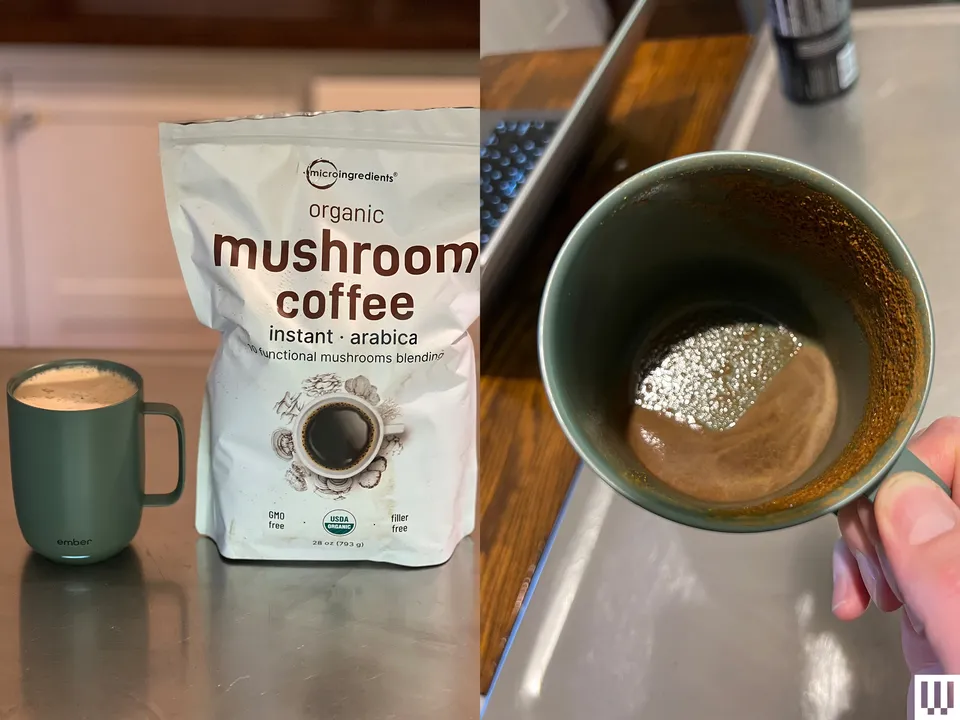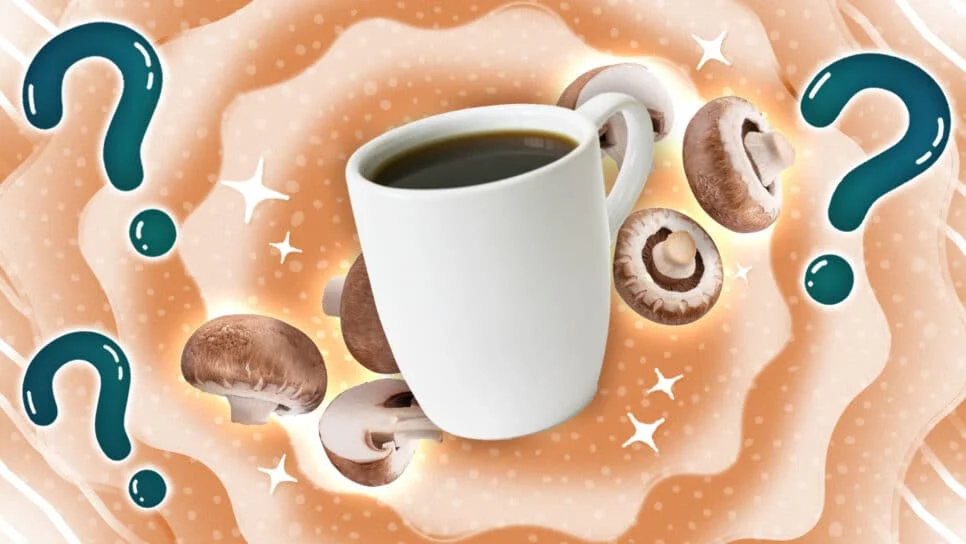You love that first sip of coffee in the morning. The rich aroma, the comforting warmth, and that familiar kick that signals it’s time to conquer the day. But if you’re like many, you’re not so fond of what comes next: the jitters, the racing heart, the wave of anxiety, and the dreaded afternoon crash that leaves you feeling more drained than before.
What if you could have the focus without the frantic energy? What if your daily ritual could support your body instead of just stimulating it?
Enter mushroom coffee, the wellness world’s trending alternative that promises exactly that. It’s popping up everywhere, from health food aisles to your favorite influencer’s morning routine. But before you make the switch, you have one crucial question that needs a clear answer.
This guide will walk you through everything you need to know, starting with the most important query of all: Does mushroom coffee actually have caffeine?
The Short Answer: Yes, But It’s Not What You Think
Let’s cut right to the chase. Yes, most mushroom coffee contains caffeine, but typically only about half the amount of a standard cup of coffee.
This isn’t a flaw; it’s a feature. The reduced caffeine content is a deliberate choice by manufacturers to provide a smoother, more balanced energy lift. The goal is to give you sustained focus and clarity, not a short-lived, jittery jolt. You get the familiar coffee flavor and ritual, but without the common downsides.
Caffeine Breakdown: Mushroom Coffee vs. Regular Coffee
To put it in perspective, let’s look at the numbers. While the exact amount can vary by brand, here is a typical side-by-side comparison for an 8-ounce (240 ml) serving.
| Drink Type | Typical Caffeine (mg) |
|---|---|
| Regular Coffee (8 oz) | 95 – 165 mg |
| Mushroom Coffee (8 oz) | 40 – 60 mg |
| Decaf Coffee (8 oz) | 2 – 5 mg |
| Green Tea (8 oz) | 25 – 30 mg |
Why Is There Less Caffeine?
The secret lies in the blend. Mushroom coffee isn’t just coffee with mushrooms sprinkled in. It’s a carefully crafted mix, typically consisting of:
- 50% Instant or Ground Coffee: This provides the classic coffee taste and a moderate dose of caffeine.
- 50% Functional Mushroom Extracts: This other half is a powerhouse of adaptogenic mushrooms that provide health benefits without adding caffeine.
By replacing half of the coffee grounds with mushroom extracts, the overall caffeine content is naturally cut in half. This brilliant combination allows you to enjoy the best of both worlds.
What Exactly Is Mushroom Coffee?
First, let’s dispel a common myth: mushroom coffee does not taste like you’re drinking a cup of portobello soup. It’s not made from the culinary mushrooms you’d find in a grocery store aisle.
Instead, it’s made with functional mushrooms, which have been used for centuries in traditional medicine for their health-promoting properties. These mushrooms are dried, extracted to concentrate their beneficial compounds, and then blended with coffee beans. The result is a smooth, earthy, and surprisingly coffee-like beverage.

Meet the “Functional Fungi”: Common Mushrooms Used
Different brands use different mushroom blends, each offering unique benefits. Here are the four most popular players you’ll encounter:
- Lion’s Mane (Hericium erinaceus): Often called the “smart mushroom,” Lion’s Mane is celebrated for its potential to support brain health. It’s linked to improved focus, mental clarity, and cognitive function. It’s the perfect partner for coffee when you need to get deep work done.
- Chaga (Inonotus obliquus): Known as the “king of mushrooms,” Chaga is an antioxidant powerhouse. It grows on birch trees in cold climates and is traditionally used to support the immune system and reduce inflammation.
- Reishi (Ganoderma lucidum): Nicknamed the “chill-out mushroom” or the “mushroom of immortality,” Reishi is a powerful adaptogen. Adaptogens help your body manage stress. Reishi promotes a sense of calm and relaxation, counteracting the anxiety-inducing effects of caffeine.
- Cordyceps (Cordyceps sinensis): Famous for its energizing properties, Cordyceps is the go-to mushroom for athletes and anyone seeking a natural performance boost. It’s believed to improve stamina, oxygen utilization, and overall vitality, helping you power through workouts or a busy day.
Answering Your Top 3 Questions (Taste, Weight Loss, Poop)
Beyond caffeine, most newcomers have a few other pressing concerns. Let’s tackle them head-on.
So, Does Mushroom Coffee Taste Like Coffee?
This is often the biggest hurdle for potential converts. The answer is yes, it tastes overwhelmingly like coffee. The coffee beans are still the dominant flavor profile. However, the mushroom extracts add a subtle, earthy depth that many people find pleasant. They round out the acidity of regular coffee, creating a smoother, less bitter brew. If you enjoy a dark, rich coffee, you’ll likely appreciate the flavor of mushroom coffee.

Can Mushroom Coffee Help You Lose Weight?
Mushroom coffee is not a magic weight-loss pill. However, it can support your weight management goals in several indirect ways:
- Metabolism Support: Cordyceps can help boost energy and endurance, potentially leading to more effective workouts.
- Stress Reduction: Reishi helps regulate cortisol (the stress hormone). High cortisol levels are linked to increased appetite and fat storage, especially around the belly. By managing stress, you may reduce stress-related cravings.
- Low-Calorie Option: Unsweetened mushroom coffee is very low in calories, making it a healthy choice compared to sugary lattes and energy drinks.
And… Does Mushroom Coffee Make You Poop?
It can, but often in a good way. Regular coffee is known for stimulating the digestive system, and mushroom coffee is no different. Additionally, mushrooms like Chaga and Reishi contain prebiotics—compounds that feed the beneficial bacteria in your gut.
A healthy gut microbiome is essential for regular, healthy bowel movements. For some, this means mushroom coffee may have a gentle, regulating effect on their digestion. If you have a sensitive stomach, it’s wise to start with a small amount to see how your body reacts.
Key Benefits of Making the Switch
Swapping your regular cup for a mushroom-infused one offers more than just reduced caffeine.
- Clean Energy Without the Jitters and Crash: This is the primary benefit. The combination of less caffeine and the adaptogenic properties of mushrooms provides a steady, sustained energy lift that won’t leave you crashing a few hours later.
- Enhanced Focus and Mental Clarity: With Lion’s Mane in the mix, you’re not just getting energy; you’re getting focus. Users often report feeling more “locked-in” and productive without the mental fog.
- Adaptogenic Support for Stress and Immunity: In our fast-paced world, who couldn’t use a little extra stress support? Reishi and Chaga work to balance your body’s response to physical and mental stressors while supporting your immune system.
Are There Any Side Effects to Consider?
Mushroom coffee is generally safe for most people. However, there are a few things to keep in mind:
- Digestive Sensitivity: As with any new food, some people may experience mild digestive upset initially. It’s best to start with a half-serving.
- Specific Medical Conditions: If you are pregnant, breastfeeding, have a mushroom allergy, or are on specific medications (like blood thinners), it’s crucial to consult your doctor before trying mushroom coffee.
- Brand Quality: The quality of the mushroom extracts matters. Choose reputable brands to avoid products with fillers, contaminants, or low-potency ingredients.
How to Choose a Great Mushroom Coffee (and Where to Buy It)
The market is growing, and not all mushroom coffees are created equal. Use this simple checklist to find a high-quality product.
Your 3-Point Checklist:
- Mushroom Source: Look for “Fruiting Body”
- The fruiting body is the actual part of the mushroom that grows above ground. It contains the highest concentration of beneficial compounds. Avoid brands that use “mycelium on grain,” which is essentially the root system grown on a grain substrate (like rice or oats). This is a cheaper production method that results in a less potent, filler-heavy product.
- Third-Party Testing
- Reputable brands will send their products to an independent lab to test for purity, potency, and the absence of heavy metals or contaminants. Look for this information on their website.
- No Fillers or Artificial Ingredients
- Your mushroom coffee should contain two main things: coffee and mushroom extracts. Be wary of brands that add excessive sugar, artificial flavors, or unnecessary fillers.
Where to Find It
You can purchase mushroom coffee from a variety of places, including online specialty stores, major e-commerce platforms like Amazon, health food stores like CHTnature, and directly from brand websites, which often offer subscription discounts.

Frequently Asked Questions (FAQ)
Can I drink mushroom coffee every day?
Yes, it’s designed for daily use. The adaptogenic benefits of the mushrooms are often most noticeable with consistent, long-term consumption.
Does mushroom coffee break a fast?
If you’re fasting for metabolic health (like with intermittent fasting), a black cup of mushroom coffee (with no milk or sugar) typically contains fewer than 5 calories and is unlikely to break your fast.
Who should not drink mushroom coffee?
People with mushroom allergies or those on specific medications should consult a healthcare professional first.
Is mushroom coffee better than regular coffee?
“Better” is subjective. If your main goal is the highest possible caffeine kick, regular coffee wins. But if you’re looking for balanced energy, enhanced focus, and stress support with less caffeine, then mushroom coffee is arguably a superior choice for your overall well-being.
The Final Verdict: Is Mushroom Coffee Worth It for You?
Let’s circle back to our starting point. You’re looking for a way to enjoy your coffee ritual without the negative side effects. You want focus, energy, and maybe even a few extra health perks.
Mushroom coffee delivers on all these fronts. It successfully bridges the gap between a traditional stimulant and a modern wellness supplement. It gives you that gentle lift you need to start your day while simultaneously providing adaptogenic ingredients that help your body build resilience over time.
If you’re ready to trade in your caffeine-induced anxiety for calm, sustained focus, then mushroom coffee isn’t just a trend—it’s an upgrade worth trying.


